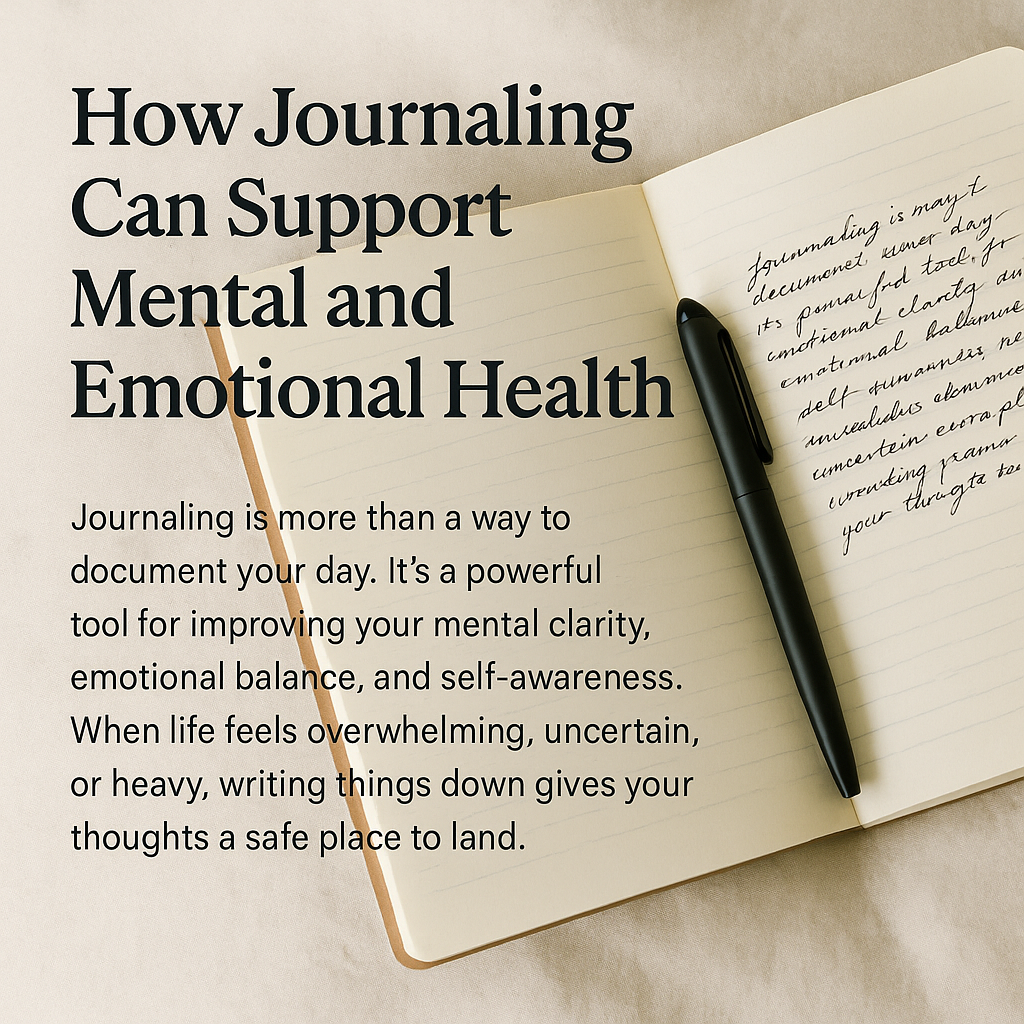Journaling is more than a way to document your day. It’s a powerful tool for improving your mental clarity, emotional balance, and self-awareness. When life feels overwhelming, uncertain, or heavy, writing things down gives your thoughts a safe place to land.
You don’t need to be a writer to benefit. All you need is a pen, a few quiet minutes, and the willingness to explore what’s going on inside.
Why Journaling Is Good for Your Mind
Putting your thoughts on paper slows down your thinking and helps you see patterns, understand emotions, and gain perspective. It allows you to process experiences instead of carrying them around in your head.
Journaling has been shown to reduce stress, anxiety, and symptoms of depression. It boosts mood, increases self-compassion, and helps regulate overwhelming emotions. It also supports memory, problem-solving, and decision-making.
Types of Journaling That Support Mental Wellness
Free writing is one of the most flexible approaches. Just start writing whatever comes to mind and don’t worry about grammar or structure. This is great for mental decluttering and emotional release.
Gratitude journaling helps shift your focus from what’s lacking to what’s good. List three things you’re grateful for each day, and over time, you may notice your outlook becoming more optimistic.
Reflective journaling invites you to think more deeply. Write about a conversation that stood out, a decision you made, or a moment that triggered a strong emotion. Ask yourself what you learned and how you responded.
Prompt-based journaling uses guided questions to explore personal topics. For example, you might answer “What am I feeling right now?” or “What do I need to let go of?”
Each style offers something different. Try them and see what supports you best.
How Journaling Helps With Stress and Anxiety
When you’re feeling overwhelmed, journaling helps bring clarity to the chaos. You can identify the source of your stress and separate facts from fear. This reduces mental noise and creates space for calm thinking.
Writing also gives you a sense of control. When your worries are on paper instead of spinning in your mind, they feel more manageable. Over time, journaling becomes a tool for navigating uncertainty with more confidence and less reactivity.
Tips to Make Journaling a Habit
Keep it simple. You don’t need to write full pages. Even five minutes a day can make a difference.
Write at the same time each day to build consistency. Many people journal in the morning to set their mindset or at night to process the day.
Use a notebook or digital tool you enjoy. If the experience feels good, you’re more likely to stick with it.
Let go of the need for perfect words. This isn’t for anyone else to read. Be honest and unfiltered.
Be curious, not critical. If something difficult comes up, explore it with compassion, not judgment.
Journal Prompts to Get Started
What emotion is most present for me today and why?
What’s been weighing on my mind lately?
What do I need more of in my life right now?
What’s one thing I’m proud of, even if it seems small?
How can I support myself better this week?
What would I say to a friend going through what I’m feeling now?
These prompts aren’t rules—just invitations. Follow where your thoughts naturally lead.
What to Do When You Don’t Know What to Write
Start with a simple sentence like “I don’t know what to write, but…” and let your pen keep moving. Describe your surroundings, your current emotions, or something that happened today. Often, once you begin, the rest flows naturally.
You can also set a timer for five minutes. Remove the pressure to be deep or insightful. Just write until the timer ends.
Journaling for Long-Term Growth
One of the most rewarding parts of journaling is looking back. Over time, you’ll notice how much you’ve grown. You’ll see how you handled difficult situations, how your thinking evolved, and how your sense of self became stronger.
Journals become more than just notebooks. They become records of your healing, resilience, and personal growth.
Final Thoughts: Write to Heal, Not to Impress
You don’t need fancy tools or perfect words to start journaling. All you need is the courage to be honest with yourself on the page. This practice can anchor you, soothe you, and reconnect you to your inner voice.
Even on the hardest days, your journal is a space where you can feel seen, heard, and understood—because it listens without judgment. Give yourself permission to slow down, reflect, and heal—one page at a time.

